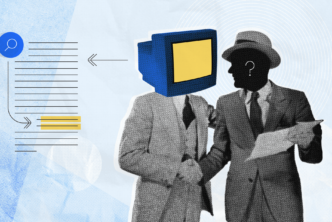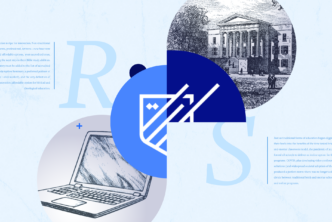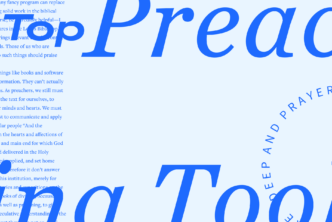Whether you already have thousands of books in your Logos library or are just getting started with Logos for the first time, it’s worth taking a look at Logos Legacy Libraries. (Legacy Libraries from Logos 5 to Logos 9 are now here!)
Legacy Libraries are the library portion of past Logos packages—the content of a Logos package minus the features and datasets. Each Library is chock-full of commentaries, reference works, and more.
That means you can get hundreds, even thousands, of biblical resources for pennies on the dollar. For example, the New Testament for Everyone 20-volume series. You’d normally pay $220. But you can get it in Logos 7 Anglican Starter Legacy Library— with dozens of other resources—for just $35 before any Dynamic Pricing. (That’s just one example; more below.)
And they’re all in the trusted Logos format, which means the information you need is just a few clicks away.
Here are seven more reasons to add a Legacy Library to your Logos.
1. Logos Legacy Libraries add more books to your current library.
If you’re like many Logos users, your library represents a significant investment. Keeping that investment safe is of utmost importance. Rest assured: your Logos library is yours to keep forever.
When you purchase a Legacy Library, all those resources are added to your current library. Your new Logos library doesn’t replace your old one—it expands it! When you get another library (say, a denominational library . . . more information on that below), your current library stays perfectly safe. In fact, it gets stronger.
For example, Logos 9 Legacy Library would add Pillar New Testament Commentary, the Baker Sermon Outlines Collection, Anchor Yale Bible Dictionary, and much more.
2. Logos Legacy Libraries are built from the ground up.
We build each Logos Library intentionally to ensure you get more of the contemporary works you rely on for your study. We also make sure newer Legacy Libraries overlap with earlier libraries to make them more affordable for our current customers.
That’s why . . .
3. A Legacy Library is the most cost-effective way to add to the resources on your digital bookshelf.
Let’s use the Logos 8 Gold Legacy Library as an example.
Consider the cost for these three commentaries:
- Pillar New Testament Commentary is $499.99
- Baker Sermon Outlines Collection is $305.99.
- Pillar New Testament Commentary is $442.99
If you bought each individually, you’d pay $1,262.97.
But a Logos 8 Gold Legacy Library is $830.00—so not only would you save $681.97, but you’d also get hundreds of other books to boot, like:
- 12 biblical studies resources, including A Cultural Handbook to the Bible, Sweeter Than Honey, Richer Than Gold: A Guided Study of Biblical Poetry and New Manners and Customs of the Bible.
- 12 Bible dictionaries and encyclopedias, like the 6-volume Anchor Yale Bible Dictionary and the Dictionary of Bible Themes
- 52 resources on preaching and teaching
- Resources on Old and New Testament studies, Greek and Hebrew grammars and lexicons, devotionals, apologetics, atlases, and maps
- And so much more
You might already own some (or many) of the 762 resources in the Logos 8 Gold Legacy Library (valued at $10,032 if sold separately!), but that’s where a wonderful little secret called Dynamic Pricing comes in.
4. With Dynamic Pricing, you’ll save even more.
Dynamic Pricing makes the deal sweeter than a glass of Texas iced tea. You’ll never pay for resources you already own a second time (which means an even lower price) because with Dynamic Pricing, you only pay for the resources that are new to you.
Dynamic Pricing routinely results in hundreds—and sometimes even thousands—of dollars in savings for Logos base package owners.
5. Legacy Libraries from different traditions have different strengths.
We’ve also put together specialty libraries designed for specific theological traditions. Anglican, Reformed, Baptist, and beyond—collections of resources from nine distinct strands of theological thought.
Even if you’re solidly in a particular theological camp, a library from a different tradition could be helpful for your study. Why? Because each tradition-specific library has unique strengths. You may be able to get a great deal on resources you’ve been hunting for in a library you never would have considered:
Logos Anglican Legacy Libraries are rich with Church history resources, like the Early Church Fathers, Classics of Western Spirituality, and the Collected Homilies of St. John Chrysostom.
Logos Baptist Legacy Libraries focus on preaching and ministry with resources such as the John MacArthur Sermon Archive (3,127 sermons), the Founder’s Press Ministry collection, and the New American Commentary series.
Logos Reformed Legacy Libraries focus on theology with collections like the 13-volume Gospel According to the Old Testament Series, the Eerdmans D. A. Carson Collection, and volumes from the Works of Jonathan Edwards.
Those are just a few examples.
6. Even if you already have thousands of books, Logos Legacy Libraries are worth it.
If you’re a bookaholic like me, you might own thousands of physical and digital books. But you won’t likely be able to reference all of your physical books each time you do Bible study or research.
But in Logos, you can—even if you never read a single one front to back.
Logos’ tagging, datasets, and features give you access to the information you need when you need it:
- Commentary excerpts show up in the Passage Guide, Bible Word Study/Lemma in Passage, and other features
- Relevant dictionary entries appear in Factbook/Dictionaries
- A diversity of systematic and biblical theologies leads to more comprehensive results in the relevant sections of Passage Guide
- More background resources and secondary literary works means more results in Passage Guide/Cultural Concepts
7. You can spread out your investment with a payment plan.
Have your eye on a Legacy Library but aren’t ready to make the full investment? You can pay in monthly installments with an interest-free payment plan. Any order over $100 qualifies. When you check out on logos.com, simply choose the payment plan option—from there, it’s easy to select the length of the plan and see your monthly payments.*
***
Thirty years ago, Logos was born (read more about our history here), and our mission hasn’t changed: to equip the Church to grow in the light of the Bible.
Whether you’re a 30-year veteran or new to the Logos family, you won’t want to miss this chance to pick up some of our best resources for an even better price.
*Logos charges a monthly fee of $5.99 to cover administrative costs.





